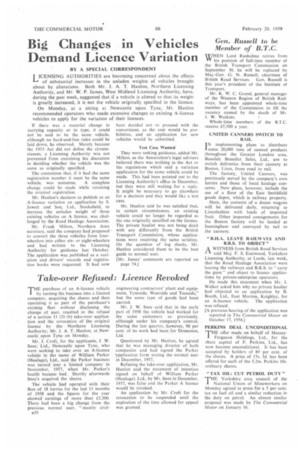Big Changes in Vehicles
Page 34

If you've noticed an error in this article please click here to report it so we can fix it.
Demand Licence Variation
BY A SPECIAL CORRESPONDENT
I ICENSING AUTHORITIES are becoming concerned about the effects 1-4 of substantial increases in the unladen weights of vehicles brought about by alterations. Both Mr. J. A. T. Hanlon, Northern Licensing Authority, and Mr. W. P. James, West Midland Licensing Authority, have, during the past week, suggested that if a vehicle is altered so that its weight is greatly increased, it is not the vehicle originally specified in the licence.
On Monday, at a sitting at Newcastle upon Tyne, Mr. Hanlon recommended operators who made extensive changes to existing A-licence vehicles to apply for the variation of their licences.
If there was a material change in carrying capacity or in type, it could not be said to be the same vehicle, although no hard-and-fast rules could be laid down, he observed. Merely because the 1933 Act did not define the circumstances, a Licensing Authority was not prevented from exercising his discretion in deciding whether the vehicle was the same as originally specified.
The contention that, if it had the same registration number it must be the same vehicle, was nonsense. A complete change could be made while retaining the original iegistration.
Mr. HanIon's decision to publish as an A-licence variation an application by S. Jewett and Son, Ltd., Stocksfield, to increase the unladen weight ofthree existing vehicles on A licence, was challenged by the Road Haulage Association.
Mr. Frank Milton, Northern Area secretary, said the company had proposed to convert the three vehicles from fourwheelers into either, sixor eight-wheelers and had written to the Licensing Authority for guidance last October. The application was published as a variation and drivers' records and registration books were requested. It had now
been decided not to proceed with the conversions, as the cost would be prohibitive, and an application for new vehicles would be submitted.
Test Case Wanted They were seeking guidance, added Mr. Milton, as the Association's legal advisers believed there was nothing in the Act or the regulations which said a variation application for the same vehicle could be made. This had been pointed out to the Licensing Authority's office in December, but they were still waiting for a reply. It might be necessary to go elsewhere for a decision and they would like a test case.
Mr. Hanlon said he was satisfied that, in certain circumstances, an existing vehicle could no longer be regarded as the one originally specified on the licence. The private haulier was not being dealt with any differently from the British Transport Commission, whose applications were receiving the same scrutiny. On the question of log sheets, Mr. Hanlon considered them to be the best guide to normal user.
[Mr. James' comments are reported on page 74.]








































































































